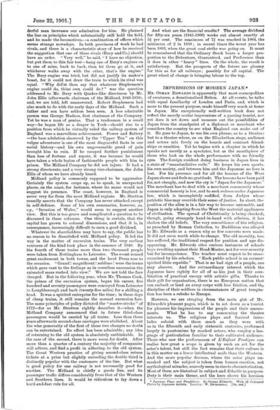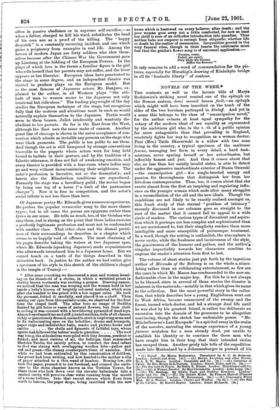IMPRESSIONS OF MODERN JAPAN.*
Mn. OSMAN EDWARDS is apparently that most cosmopolitan of creatures, a denationalised Briton. At all events, he talks with equal familiarity of London and Paris, and, which is more to the present purpose, made himself very much at home in Japan. His exceptionally well-written book does not reflect the merely ocular impressions of a passing tourist, nor yet does it set down and measure out the possibilities of Japan from the standpoint of a diplomat or merchant who considers the country to see what England can make out of it. He goes-to-Japan, to use his own phrase, as to a theatre ; but to a theatre where, as on the Elizabethan stage, audience and actora 'mix freely on the boards and contract friend- ships or enmities. Yet he begins with a chapter in which he speaks not merely as a spectator, but as the mouthpiece of those who look on the whole performance with no friendly eyes. The foreign resident doing business in Japan lives in a state of " unassithilative exile." He keeps his own sports, his own society, and between him and the Japanese no love is lost. For his presence and for all the lessons of the West Japan shows and feels no gratitude. The lessons have been paid for, not cheaply, and now the cry is "Japan for the Japanese." The merchant has to deal with a merchant community whose commercial honesty is low, and to seek redress under Japanese law, which is incompletely codified, from Judges whose patriotic bias may override their sense of justice. In short, the position of the alien is in a fair way to become untenable, and Japan is only adopting from the West the material appliances of civilisation. The spread of Christianity is being checked;. though, going strangely hand-in-band with atheism, it has shaken the old beliefs. The very resemblance of the religion. as preached by Roman Catholics, to Buddhism was alleged to Mr. Edwards as a reason why so few converts were made. It did not seem worth while to change. The old morality, too, has suffered, the traditional respect for position and age dis- appearing. Mr. Edwards cites curious instances of school- boys revolting against their Head-Master, not for over-severity but for incompetence. The teacher must expect to be cross- examined by his scholars. "Each public school is an earnest spirited little republic." That is no bad sign of a people, one may observe. And the extraordinary interest which the Japanese have rightly for all of us lies just in their com- bination of practical energy with artistic gifts. Thanks tc> their gift for organisation, there is no European nation that can embark or land an army corps with less friction, and the discipline of their soldiers in circumstances Of great tempta- tion has been a rebuke to Europe.
However, we are straying from the main gist of Mr. Edwards's pleasant pages, which is to set down as a tourist for pleasure his impressions of the people and their amuse- ments. What he has to say concerning the theatre interests us. The religious plays and farcical inter- ludes subsist with them much as they were with us in the fifteenth and early sixteenth centuries, performed. largely in pantomime by masked actors, who employ a lan- guage of gesticulation familiar to their cultivated audience. Those who saw the performance of L 'Enfant Prodigue can realise how great a scope is given by such an art for the actor's talent, but still the fact remains that their culture is in this matter on a lower intellectual scale than the Western. And the more popular dramas, where the actor plays un- masked and the subject is taken from human emotion, not mythological miracles, scarcely seem to rise to characterisation. Most of them are historical in subject and didactic in purpose. Duty is their main theme, and the hero shows his heroism • Japanese Plays and Playfellotes. By Osman Edwards. With 12 Coloured Plates by Japanese Artiste. London : W. Heinemann. [10a. net.1
often in passive obedience or in supreme self-sacrifice,—as when a father, charged to kill his ward, substitutes the head of his own son as a proof of the killing. The "happy despatch" is a constantly recurring incident, and one which gains a poignancy from examples in real life. Among the heroes of modern Japan are forty soldiers who slew them- selves because after the Chinese War the Government gave up Liaotung at the bidding of the European Powers. In the plays of which love is the theme a familiar figure is the girl who sells herself that her parents may not suffer, and the lover
appears as her liberator. European ideas have penetrated to the stage in some degree, and an independent theatre was started to produoe plays on the European model. But as the most famous of Japanese actors, Mr. Danjuro, ex- plained to the author, in all Western plays "the atti- tude of men to women seems to the Japanese not only irrational but ridiculous." The leading playwright of the day studies the European technique of the stage, but recognises
fully that the motives and situations must be such as would naturally explain themselves to the Japanese. Portia would seem to them brazen, Juliet intolerably and wantonly dis- obedient to her parents. So far is the East from the West, although the East uses the same make of cannon. Another great line of cleavage is shown in the naive acceptance of con- vention which admits as invisible any persons on the stage who wear black garments. The public is too polite to see them. And though the art is still hampered by strange conventions traceable to the puppets whom actors were for long held bound to imitate in their gesture, and by the tradition of a falsetto utteranoe, it does not fail of awakening emotion, and every theatre is provided with a tear-room where ladies may go and weep without inconveniencing their neighbours. The actor's profession is lucrative, not so the dramatist's ; and herein also the Elizabethan conditions are reproduced. Formerly the stage was a hereditary guild ; the novice began by being one leg of a horse ("a limb of the pantomime charger"). Now it is free to competition, and the actor's social tribute is not less there than here.
Of Japanese poetry Mr. Edwards gives numerous specimens.
He prefers the popular vernacular song to the more classic types ; but in all cases the poems are epigrams rather than lyrics in our sense. He tells us much, too, of the Geishas who sing them, and is strong on the point that these ladies exercise a perfectly legitimate profession and must not be confounded with another class. That other class and the dismal pretti- ness of their surroundings he describes in a chapter which seems to us happily void of offence. The most charming of his pages describe taking the waters at two Japanese spas, where Mr. Edwards (speaking Japanese) made acquaintances who afterwards introduced him to a Japanese home. But we cannot touch on a tenth of the things described in this attractive book. In justice to the author we had rather give a specimen of his style in this sketch of the children's chapel In the temple of Tennoji :—
" After some searching we discovered a man and woman kneel- ing on the threshold of a shrine, in which a wrinkled priest in shabby brown vestments was reciting a prayer. Drawing nearer, we noticed that the man was weeping and the woman held in her hands a baby's kimono of brightly coloured material, which soon after she handed to the priest with a few copper coins. lie took the garment, folded it carefully, and placed it on a shelf. Then raising our eyes from this pathetic scene, we observed for the first time the chapel itself. The altar bore no image of Buddha flanked by gilt lotus or vases of natural flowers, but from cloth to ceiling it was covered with a bewildering pyramid of dead toys. Alinond-eyed manikins and stiff-jointed maidens,dolle of all classes, richly or penuriously dressed, seemed to stretch imploring arms and to fix hallucinating eyes on the beholder; drums and trumpets, paper ships and indiarubber balls, masks and picture-books and
rattles the shells and figments of faithful toys, whose spirits had followed the babies' souls to paradise. The roof
was hung, the side shelves were piled with tiny dresses, pendent or folded; and most curious of all, the bellrope, that summoned Shotoku Taislie, the saintly prince, to conduct the dead infant to God was strung with overlapping woollen bibs—yellow and red and green—the clumsy counterparts these of aureoles. But while we had been enthralled by this canonisation of dolldom, the priest had been writing, and now handed to the mother a slip of paper attached to a thin wand of bamboo. Bowing low, she took the paper, pressed it to her forehead, and crossed the enclo- sure to the stone chamber known as the Tortoise Tower, for there those who look down over the circular balustrade into a central cavity will perceive clear water running from the mouth of a atone tortoise. Into that sacred stream which flows from earth to heaven, the paper drops, being inscribed with the new name which is bestowed on every believer after death ; and the poor woman goes away not a little comforted, for now at least her child is sure of an orthodox introduction into paradise. Thus neither babe nor emperor is exempt from etiquette, whether life or death be the matter of ceremonies. Inequalities persist in the very funeral rites, though in their hearts the celebrants must feel that the geisha's flower song is of universal application :--
Peonies, roses, Faded, are equal ; Only while life blooms Differ the flowers.' "
It only remains to add a word of commendation for the pic- tures, especially for Hiroshigi's drawing of Kinlaikyio bridge in all its "fantastic liberty" of contour.











































 Previous page
Previous page